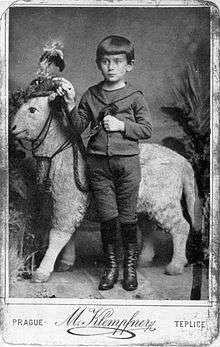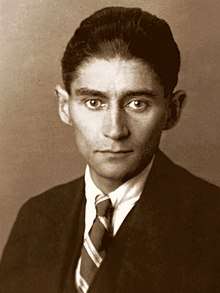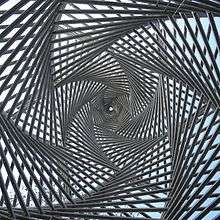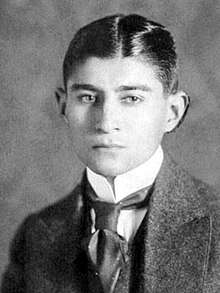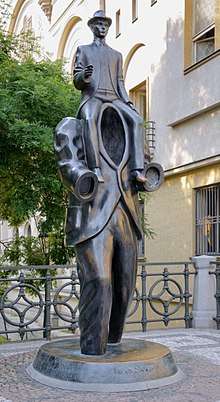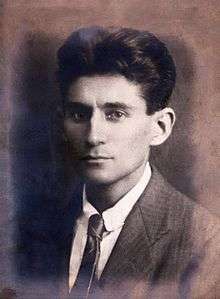
It is entirely conceivable that life’s splendour forever lies in wait about each one of us in all its fullness, but veiled from view, deep down, invisible, far off. It is there, though, not hostile, not reluctant, not deaf. If you summon it by the right word, by its right name, it will come. This is the essence of magic, which does not create but summons.
Franz Kafka (3 July 1883 – 3 June 1924) was a Bohemian-Jewish novelist, and one of the major German-language fiction writers of the 20th century.
Quotes
- Verlassen sind wir doch wie verirrte Kinder im Walde. Wenn Du vor mir stehst und mich ansiehst, was weißt Du von den Schmerzen, die in mir sind und was weiß ich von den Deinen. Und wenn ich mich vor Dir niederwerfen würde und weinen und erzählen, was wüßtest Du von mir mehr als von der Hölle, wenn Dir jemand erzählt, sie ist heiß und fürchterlich. Schon darum sollten wir Menschen vor einander so ehrfürchtig, so nachdenklich, so liebend stehn wie vor dem Eingang zur Hölle.
- We are as forlorn as children lost in the woods. When you stand in front of me and look at me, what do you know of the griefs that are in me and what do I know of yours? And if I were to cast myself down before you and weep and tell you, what more would you know about me than you know about Hell when someone tells you it is hot and dreadful? For that reason alone we human beings ought to stand before one another as reverently, as reflectively, as lovingly, as we would before the entrance to Hell.
- Letter to Oskar Pollak (8 November 1903); cited from Briefe, 1902-1924 (1958) edited by [Max Brod]], p. 27 ; translation from Franz Kafka, Representative Man (1991) by Frederick R. Karl, p. 98
- We are as forlorn as children lost in the woods. When you stand in front of me and look at me, what do you know of the griefs that are in me and what do I know of yours? And if I were to cast myself down before you and weep and tell you, what more would you know about me than you know about Hell when someone tells you it is hot and dreadful? For that reason alone we human beings ought to stand before one another as reverently, as reflectively, as lovingly, as we would before the entrance to Hell.
- Ich glaube, man sollte überhaupt nur solche Bücher lesen, die einen beißen und stechen. Wenn das Buch, das wir lesen, uns nicht mit einem Faustschlag auf den Schädel weckt, wozu lesen wir dann das Buch? Damit es uns glücklich macht, wie Du schreibst? Mein Gott, glücklich wären wir eben auch, wenn wir keine Bücher hätten, und solche Bücher, die uns glücklich machen, könnten wir zur Not selber schreiben. Wir brauchen aber die Bücher, die auf uns wirken wie ein Unglück, das uns sehr schmerzt, wie der Tod eines, den wir lieber hatten als uns, wie wenn wir in Wälder verstoßen würden, von allen Menschen weg, wie ein Selbstmord, ein Buch muß die Axt sein für das gefrorene Meer in uns. Das glaube ich.
- I think we ought to read only the kind of books that wound and stab us. If the book we are reading doesn't wake us up with a blow on the head, what are we reading it for? ...we need the books that affect us like a disaster, that grieve us deeply, like the death of someone we loved more than ourselves, like being banished into forests far from everyone, like a suicide. A book must be the axe for the frozen sea inside us.
- Letter to Oskar Pollak (27 January 1904)
- Variant translations:
- If the book we are reading does not wake us, as with a fist hammering on our skulls, then why do we read it? Good God, we also would be happy if we had no books and such books that make us happy we could, if need be, write ourselves. What we must have are those books that come on us like ill fortune, like the death of one we love better than ourselves, like suicide. A book must be an ice axe to break the sea frozen inside us.
- What we need are books that hit us like a most painful misfortune, like the death of someone we loved more than we love ourselves, that make us feel as though we had been banished to the woods, far from any human presence, like a suicide. A book must be the ax for the frozen sea within us.
- A book should be an ice-axe to break the frozen sea within us.
- A book must be an ice-axe to break the seas frozen inside our soul.
- A book should serve as the ax for the frozen sea within us.
- I think we ought to read only the kind of books that wound and stab us. If the book we are reading doesn't wake us up with a blow on the head, what are we reading it for? ...we need the books that affect us like a disaster, that grieve us deeply, like the death of someone we loved more than ourselves, like being banished into forests far from everyone, like a suicide. A book must be the axe for the frozen sea inside us.
- Now the Sirens have a still more fatal weapon than their song, namely their silence... Someone might possibly have escaped from their singing; but from their silence, certainly never.
- "The Silence of the Sirens" (October 1917)
- "The bliss of murder! The relief, the soaring ecstasy from the shedding of another’s blood! Wese, old nightbird, friend, alehouse crony, you are oozing away into the dark earth below the street. Why aren’t you simply a bladder of blood so that I could stamp on you and make you vanish into nothingness? Not all we want comes true, not all the dreams that blossomed have borne fruit, your solid remains lie here, already indifferent to every kick. What’s the good of the dumb question you are asking?"
- "A Fratricide" (1917)
- Plenty of hope — for God — no end of hope — only not for us.
- In conversation with Max Brod (1920), after Brod had queried on there being "hope outside this manifestation of the world that we know", as quoted in Franz Kafka: A Biography [Franz Kafka, eine Biographie] (1937) by Max Brod, as translated by G. Humphreys Roberts and Richard Winston (1947; 1960); at least as early as Franz Kafka : Parable and Paradox (1962) by Heinz Politzer, this assertion has often appeared paraphrased as: "There is hope, but not for us", and sometimes "There is hope — only not for us."
- Variant translations:
- Oh, plenty of hope, an infinite amount of hope — but not for us.
- As translated in Weimar Intellectuals and the Threat of Modernity (1988) by Dagmar Barnouw, p. 187
The Metamorphosis (1915)
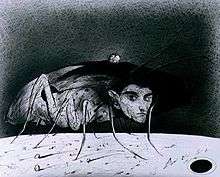
As Gregor Samsa awoke one morning from uneasy dreams he found himself transformed in his bed into an enormous insect.
- Als Gregor Samsa eines Morgens aus unruhigen Träumen erwachte, fand er sich in seinem Bett zu einem ungeheuren Ungeziefer verwandelt.
- As Gregor Samsa awoke one morning from uneasy dreams he found himself transformed in his bed into an enormous insect.
- First lines
- Variant translation (by David Wyllie): One morning, when Gregor Samsa woke from troubled dreams, he found himself transformed in his bed into a horrible vermin.
- As Gregor Samsa awoke one morning from uneasy dreams he found himself transformed in his bed into an enormous insect.
- What a fate: to be condemned to work for a firm where the slightest negligence at once gave rise to the gravest suspicion! Were all the employees nothing but a bunch of scoundrels, was there not among them one single loyal devoted man who, had he wasted only an hour or so of the firm's time in the morning, was so tormented by conscience as to be driven out of his mind and actually incapable of leaving his bed?
- How about if I sleep a little bit longer and forget all this nonsense.
- "Hey, there’s something falling down in there," said the chief clerk. Gregor tried to suppose to himself that what had happened to him might some day also happen to the chief clerk. There was no denying that anything was possible.
- I cannot make you understand. I cannot make anyone understand what is happening inside me. I cannot even explain it to myself.
- Was he an animal, that music could move him so? He felt as if the way to the unknown nourishment he longed for were coming to light.
- He thought back on his family with deep emotion and love. His conviction that he would have to disappear was, if possible, even firmer than his sister's. He remained in this state of empty and peaceful reflection until the tower clock struck three in the morning. He still saw that outside the window everything was beginning to grow light. Then, without his consent, his head sank down to the floor, and from his nostrils streamed his last weak breath.
The Zürau Aphorisms (1917 - 1918)
All human errors are impatience, the premature breaking off of what is methodical, an apparent fencing in of the apparent thing.
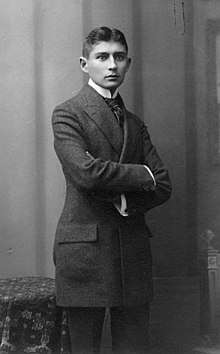
From a certain point onward there is no longer any turning back. That is the point that must be reached.
- Written from September 1917 to April 1918, many of these statements in Kafka's notebooks were first published posthumously in 1931, and later in Parables and Paradoxes (1946), and The Blue Octavo Notebooks (1954) as translated by Ernst Kaiser and Eithne Wilkins (original German text)
- See also The Zürau Aphorisms
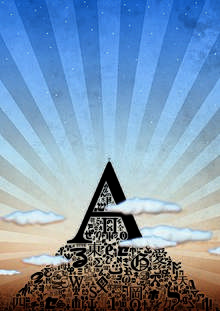
If it had been possible to build the Tower of Babel without ascending it, the work would have been permitted.

The indestructible is one: it is each individual human being and, at the same time, it is common to all, hence the incomparably indivisible union that exists between human beings.
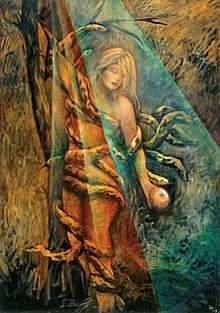
Why do we complain about the Fall? It is not on its account that we were expelled from Paradise, but on account of the Tree of Life, lest we might eat of it.

We are sinful not only because we have eaten of the Tree of Knowledge, but also because we have not yet eaten of the Tree of Life.
- The true way is along a rope that is not spanned high in the air, but only just above the ground. It seems intended more to cause stumbling than to be walked upon.
- 1
- All human errors are impatience, the premature breaking off of what is methodical, an apparent fencing in of the apparent thing.
- 2
- Variant translation: All human errors are impatience, a premature breaking off of methodical procedure, an apparent fencing-in of what is apparently at issue.
- There are two main human sins from which all the others derive: impatience and indolence. It was because of impatience that they were expelled from Paradise; it is because of indolence that they do not return. Yet perhaps there is only one major sin: impatience. Because of impatience they were expelled, because of impatience they do not return.
- 3 (20 October 1917); as published in The Blue Octavo Notebooks (1954); also in Dearest Father: Stories and Other Writings (1954); variant translations use "cardinal sins" instead of "main human sins" and "laziness" instead of "indolence".
- Beyond a certain point there is no return. This point has to be reached.
- 5; variant translations:
From a certain point onward there is no longer any turning back. That is the point that must be reached.- As quoted in The Unfinished Country: A Book of American Symbols (1959) by Max Lerner, p. 452; also in Wait Without Idols (1964) by Gabriel Vahanian, p, 216; in Joyce, Decadence, and Emancipation (1995) by Vivian Heller, 39; in "The Sheltering Sky" (1949) by Paul Bowles, p. 213; and in the poem "Father and Son" by Delmore Schwartz.
- There is a point of no return. This point has to be reached.
- 5; variant translations:
- The decisive moment in human evolution is perpetual. That is why the revolutionary spiritual movements that declare all former things worthless are in the right, for nothing has yet happened.
- 6
- To animalise is humane, to humanise is animal.
- 9; parody of a statement of Victor Hugo
- One of the first signs of the beginnings of understanding is the wish to die. This life appears unbearable, another unattainable. One is no longer ashamed of wanting to die; one asks to be moved from the old cell, which one hates, to a new one, which one will only in time come to hate.
- 13
- A cage went in search of a bird.
- 16
- If it had been possible to build the Tower of Babel without climbing it, it would have been permitted.
- 18; (9 November 1917) a slight variant of this was published in Parables and Paradoxes (1946): If it had been possible to build the Tower of Babel without ascending it, the work would have been permitted.
- Leopards break into the temple and drink to the dregs what is in the sacrificial pitchers; this is repeated over and over again; finally it can be calculated in advance, and it becomes a part of the ceremony.
- 20 (10 November 1917)
- From the true antagonist illimitable courage is transmitted to you.
- 23
- Hiding places there are innumerable, escape is only one, but possibilities for escape, again, are as many as hiding places. There is a goal, but no way; what we call a way is hesitation.
- 27
- When one has once accepted and absorbed Evil, it no longer demands to be believed.
- 28
- The ulterior motives with which you absorb and assimilate Evil are not your own but those of Evil.
The animal wrests the whip from its master and whips itself in order to become master, not knowing that this is only a fantasy produced by a new knot in the master’s whiplash.- 29
- In a certain sense the Good is comfortless.
- 30
- Self-control is something for which I do not strive. Self-control means wanting to be effective at some random point in the infinite radiations of my spiritual existence.
- 31
- Martyrs do not underrate the body, they allow it to be elevated on the cross. In this they are at one with their antagonists.
- 33
- His weariness is that of the gladiator after the combat; his work was the whitewashing of a corner in a state official's office.
- 34
- Variant translation: His exhaustion is that of the gladiator after the fight, his work was the whitewashing of one corner in a clerk’s office.
- Previously I did not understand why I got no answer to my question; today I do not understand how I could believe I was capable of asking. But I didn’t really believe, I only asked.
- 36
- The way is infinitely long, nothing of it can be subtracted, nothing can be added, and yet everyone applies his own childish yardstick to it. “Certainly, this yard of the way you still have to go, too, and it will be accounted unto you.”
- 39
- It is only our conception of time that makes us call the Last Judgment by this name. It is, in fact, a kind of martial law.
- 40
- Believing in progress does not mean believing that any progress has yet been made. That is not the sort of belief that indicates real faith.
- 48
- Der Mensch kann nicht leben ohne ein dauerndes Vertrauen zu etwas Unzerstörbarem in sich, wobei sowohl das Unzerstörbare als auch das Vertrauen ihm dauernd verborgen bleiben können. Eine der Ausdrucksmöglichkeiten dieses Verborgen-Bleibens ist der Glaube an einen persönlichen Gott.
- Man cannot live without a permanent trust in something indestructible in himself, though both the indestructible element and the trust may remain permanently hidden from him. One of the ways in which this hiddenness can express itself is through faith in a personal god.
- 50
- Man cannot live without a permanent trust in something indestructible in himself, though both the indestructible element and the trust may remain permanently hidden from him. One of the ways in which this hiddenness can express itself is through faith in a personal god.
- In the struggle between yourself and the world, second the world.
- 52, Im Kampf zwischen Dir und der Welt, sekundiere der Welt.
- Aphorism 52 in Unpublished Works 1916-1918
- Variant translations:
- In the struggle between yourself and the world, back the world.
- In the struggle between yourself and the world, side with the world.
- In the fight between you and the world, back the world.
- One must not cheat anyone, not even the world of its victory.
- 53
- Variant translation: One must not cheat anybody, not even the world of one's triumph.
- There is nothing besides a spiritual world; what we call the world of the senses is the Evil in the spiritual world, and what we call Evil is only the necessity of a moment in our eternal evolution.
One can disintegrate the world by means of very strong light. For weak eyes the world becomes solid, for still weaker eyes it seems to develop fists, for eyes weaker still it becomes shamefaced and smashes anyone who dares to gaze upon it.- 54
- There are questions we could not get past if we were not set free from them by our very nature.
- 56
- One tells as few lies as possible only by telling as few lies as possible, and not by having the least possible opportunity to do so.
- 58
- The fact that there is nothing but a spiritual world deprives us of hope and gives us certainty.
- 62
- Expulsion from Paradise is in its main aspect eternal: that is to say, although expulsion from Paradise is final, and life in the world unavoidable, the eternity of the process (or, expressed in temporal terms, the eternal repetition of the process) nevertheless makes it possible not only that we might remain in Paradise permanently, but that we may in fact be there permanently, no matter whether we know it here or not.
- 65; a slight variant of this statement was later published in Parables and Paradoxes (1946):
The expulsion from Paradise is in its main significance eternal:
Consequently the expulsion from Paradise is final, and life in this world irrevocable, but the eternal nature of the occurrence (or, temporally expressed, the eternal recapitulation of the occurrence) makes it nevertheless possible that not only could we live continuously in Paradise, but that we are continuously there in actual fact, no matter whether we know it here or not.
- 65; a slight variant of this statement was later published in Parables and Paradoxes (1946):
- What is gayer than believing in a household god?
- 68
- Theoretically there is a perfect possibility of happiness: believing in the indestructible element in oneself and not striving towards it.
- 69
- The indestructible is one: it is each individual human being and, at the same time, it is common to all, hence the incomparably indivisible union that exists between human beings.
- 71
- If what was supposed to have been destroyed in Paradise was destructible, then it was not decisive; but if it was indestructible, then we are living in a false belief.
- 74
- Test yourself on mankind. It is something that makes the doubter doubt, the believer believe.
- 75
- Association with human beings lures one into self-observation.
- 77
- Sensual love deceives one as to the nature of heavenly love; it could not do so alone, but since it unconsciously has the element of heavenly love within it, it can do so.
- 79
- Truth is indivisible, hence it cannot recognize itself; anyone who wants to recognize it has to be a lie.
- 80
- Why do we complain about the Fall? It is not on its account that we were expelled from Paradise, but on account of the Tree of Life, lest we might eat of it.
- 82, a slight variant of this was later published in Parables and Paradoxes (1946):
Why do we lament over the fall of man? We were not driven out of Paradise because of it, but because of the Tree of Life, that we might not eat of it. - "Paradise"
- 82, a slight variant of this was later published in Parables and Paradoxes (1946):
- The whole visible world is perhaps nothing more than than the rationalization of a man who wants to find peace for a moment. An attempt to falsify the actuality of knowledge, to regard knowledge as a goal still to be reached.
- "Paradise"
- We are sinful not only because we have eaten of the Tree of Knowledge, but also because we have not yet eaten of the Tree of Life. The state in which we are is sinful, irrespective of guilt.
- 83, a slight variant of this was later published in Parables and Paradoxes (1946):
We are sinful not merely because we have eaten of the Tree of Knowledge, but also because we have not yet eaten of the Tree of Life. The state in which we find ourselves is sinful, quite independent of guilt.- Also quoted in this form in The Parables of Peanuts (1968) by Robert L. Short, and Like a Dream, Like a Fantasy: The Zen Teachings and Translations of Nyogen (2005)
- 83, a slight variant of this was later published in Parables and Paradoxes (1946):
- Evil is a radiation of the human consciousness in certain transitional positions. It is not actually the sensual world that is a mere appearance; what is so is the evil of it, which, admittedly, is what constitutes the sensual world in our eyes.
- 85
- The whole visible world is perhaps nothing other than a motivation of man’s wish to rest for a moment — an attempt to falsify the fact of knowledge, to try to turn the knowledge into the goal.
- 86
- A belief is like a guillotine, just as heavy, just as light.
- 87
- Two possibilities: making oneself infinitely small or being so. The second is perfection, that is to say, inactivity, the first is beginning, that is to say, action.
- 90
- Towards the avoidance of a piece of verbal confusion: What is intended to be actively destroyed must first of all have been firmly grasped; what crumbles away crumbles away, but cannot be destroyed.
- 91
- The first worship of idols was certainly fear of the things in the world, but, connected with this, fear of the necessity of the things, and, connected with this, fear of responsibility for the things. So tremendous did this responsibility appear that people did not even dare to impose it upon one single extra-human entity, for even the mediation of one being would not have sufficiently lightened human responsibility, intercourse with only one being would still have been all too deeply tainted with responsibility, and that is why each thing was given the responsibility for itself, more indeed, these things were also given a degree of responsibility for man.
- 92
- There can be knowledge of the diabolical, but no belief in it, for more of the diabolical than there is does not exist.
- 99
- We too must suffer all the suffering around us. We all have not one body, but we have one way of growing, and this leads us through all anguish, whether in this or in that form. Just as the child develops through all the stages of life right into old age and to death (and fundamentally to the earlier stage the later one seems out of reach, in relation both to desire and to fear), so also do we develop (no less deeply bound up with mankind than with ourselves) through all the sufferings of this world. There is no room for justice in this context, but neither is there any room either for fear of suffering or for the interpretation of suffering as a merit.
- 103
- Du kannst Dich zurückhalten von den Leiden der Welt, das ist Dir freigestellt und entspricht Deiner Natur, aber vielleicht ist gerade dieses Zurückhalten das einzige Leid, das Du vermeiden könntest.
- You can hold yourself back from the sufferings of the world, that is something you are free to do and it accords with your nature, but perhaps this very holding back is the one suffering you could avoid.
- 104
- Humility provides everyone, even him who despairs in solitude, with the strongest relationship to his fellow man, and this immediately, though, of course, only in the case of complete and permanent humility. It can do this because it is the true language of prayer, at once adoration and the firmest of unions. The relationship to one’s fellow man is the relationship of prayer, the relationship to oneself is the relationship of striving; it is from prayer that one draws the strength for one’s striving.
- 106
- "It cannot be said that we are lacking in faith. Even the simple fact of our life is of a faith-value that can never be exhausted.” “You suggest there is some faith-value in this? One cannot not-live, after all.” “It is precisely in this ‘Cannot, after all’ that the mad strength of faith lies; it is in this negation that it takes on form.”
There is no need for you to leave the house. Stay at your table and listen. Don’t even listen, just wait. Don’t even wait, be completely quiet and alone. The world will offer itself to you to be unmasked; it can’t do otherwise; in raptures it will writhe before you.- 109
- Variant translations:
- It is not necessary that you leave the house. Remain at your table and listen. Do not even listen, only wait. Do not even wait, be wholly still and alone. The world will present itself to you for its unmasking, it can do no other, in ecstasy it will writhe at your feet.
- You do not need to leave your room. Remain sitting at your table and listen. Do not even listen, simply wait, be quiet, still and solitary. The world will freely offer itself to you to be unmasked, it has no choice, it will roll in ecstasy at your feet.
- You do not need to leave your room. Remain sitting at your table and listen. Do not even listen, simply wait. Do not even wait, be quiet still and solitary. The world will freely offer itself to you to be unmasked, it has no choice, it will roll in ecstasy at your feet.
The Trial (1920)
What an obstacle had suddenly arisen to block K.'s career!
- Published as Der Prozess (1925); full text online
- Someone must have been telling lies about Joseph K., for without having done anything wrong he was arrested one fine morning. His landlady's cook, who always brought him his breakfast at eight o'clock, failed to appear on this occasion. That had never happened before.
- First lines, Ch. 1
- Variant translation: Somebody must have slandered Joseph K., for without having done anything wrong he was arrested one fine morning.
- It would have been so pointless to kill himself that, even if he had wanted to, the pointlessness would have made him unable.
- Ch. 1
- They're talking about things of which they don't have the slightest understanding, anyway. It's only because of their stupidity that they're able to be so sure of themselves.
- Ch. 1
- This question of yours, Sir, about my being a house painter — or rather, not a question, you simply made a statement — is typical of the whole character of this trial that is being foisted on me. You may object that it is not a trial at all; you are quite right, for it is only a trial if I recognize it as such. But for the moment I do recognize it, on grounds of compassion, as it were. One can't regard it except with compassion, if one is to regard it at all. I do not say that your procedure is contemptible, but I should like to present that epithet to you for your private consumption.
- Josef K. in Ch. 2
- Variant translation: Your question, Mr. Examining Magistrate, as to whether I am a house-painter — although you did not ask a question at all, you made a statement — typifies exactly the kind of proceedings that are being instituted against me.
- The right understanding of any matter and a misunderstanding of the same matter do not wholly exclude each other.
- What an obstacle had suddenly arisen to block K.'s career! And this was the moment when he was supposed to work for the bank? He looked down at his desk. This the time to interview clients and negotiate with them? While his case was unfolding itself, while up in the attics the Court officials were poring over the charge papers, was he to devote his attention to the affairs of the bank? It looked like a kind of torture sanctioned by the Court, arising from his case and concomitant with it.
- Ch. 7
- Even that has its reason; it is often better to be in chains than to be free.
- Ch. 8
- '...it is not necessary to accept everything as true, one must only accept it as necessary.' 'A melancholy conclusion,' said K. 'It turns lying into a universal principle.In the Cathedral
- Chapter 9
- Logic may indeed be unshakeable, but it cannot withstand a man who is determined to live. Where was the judge he had never seen? Where was the High Court he had never reached? He raised his hands and spread out all his fingers. But the hands of one of the men closed round his throat, just as the other drove the knife deep into his heart and turned it twice.
- Ch. 10
- "Like a dog!" he said, it was as if the shame of it should outlive him.
- Ch. 10, end of the book
The Castle (1926)
- I dream of a grave, deep and narrow, where we could clasp each other in our arms as with clamps, and I would hide my face in you and you would hide your face in me, and nobody would ever see us any more
- One must fight to get to the top, especially if one starts at the bottom.
- There's no quiet place here on earth for our love, not in the village and not anywhere else, so I picture a grave, deep and narrow, in which we embrace as if clamped together, I bury my face against you, you yours against me, and no one will ever see us.
- If a man has his eyes bound, you can encourage him as much as you like to stare through the bandage, but he'll never see anything
Parables and Paradoxes (1946)
- Many statements from this work are in the earlier section "Aphorisms" (1918)
- The whole visible world is perhaps nothing more than than the rationalization of a man who wants to find peace for a moment. An attempt to falsify the actuality of knowledge, to regard knowledge as a goal still to be reached.
- "Paradise"
- The Messiah will come only when he is no longer necessary; he will come only on the day after his arrival; he will come, not on the last day, but on the very last day.
- Variant translation: The Messiah will come only when he is no longer necessary; he will come only on the day after his arrival; he will come, not on the last day, but at the very last.
The Diaries of Franz Kafka 1910-1923 (1948)
- Edited by Max Brod
- I can prove at any time that my education tried to make another person out of me than the one I became. It is for the harm, therefore, that my educators could have done me in accordance with their intentions that I reproach them; I demand from their hands the person I now am, and since they cannot give him to me, I make of my reproach and laughter a drumbeat sounding in the world beyond.
- (July 1910)
- "Don't you want to join us?" I was recently asked by an acquaintance when he ran across me alone after midnight in a coffeehouse that was already almost deserted. "No, I don't," I said.
- (June 1914)
- Eternal childhood. Life calls again.
It is entirely conceivable that life’s splendour forever lies in wait about each one of us in all its fullness, but veiled from view, deep down, invisible, far off. It is there, though, not hostile, not reluctant, not deaf. If you summon it by the right word, by its right name, it will come. This is the essence of magic, which does not create but summons.- (18 October 1921)
- Anyone who cannot come to terms with his life while he is alive needs one hand to ward off a little his despair over his fate — he has little success in this — but with his other hand he can note down what he sees among the ruins, for he sees different (and more) things than do the others; after all, dead as he is in his own lifetime, he is the real survivor. This assumes that he does not need both hands, or more hands than he has, in his struggle against despair.
- (19 October 1921)
Letters to Milena (1952)

Perhaps it isn’t love when I say you are what I love the most — you are the knife I turn inside myself, this is love.
- Letters to Milena Jesenská, first published in Briefe an Milena (1952)
- Hat matt nicht die Augen, um sich sie auszureißen und das Herz zum gleichen Zweck? Dabei ist es ja nicht so schlimm, das ist Übertreibung und Lüge, alles ist Übertreibung, nur die Sehnsucht ist wahr, die kann man nicht übertreiben. Aber selbst die Wahrheit der Sehnsucht ist nicht so sehr ihre Wahrheit, als vielmehr der Ausdruck der Lüge alles übrigen sonst. Es klingt verdreht, aber es ist so.
Auch ist es vielleicht nicht eigentlich Liebe wenn ich sage, daß Du mir das Liebste bist; Liebe ist, daß Du mir das Messer bist, mit dem ich in mir wühle.- Aren’t our eyes made to be torn out, and our hearts for the same purpose? At the same time it’s really not that bad; that’s an exaggeration and a lie, everything is exaggeration, the only truth is longing, which cannot be exaggerated. But even the truth of longing is not so much its own truth; it’s really an expression of everything else, which is a lie. This sounds crazy and distorted, but it’s true.
Moreover, perhaps it isn’t love when I say you are what I love the most — you are the knife I turn inside myself, this is love. - Variant translations:
- In this love you are like a knife, with which I explore myself.
- Aren’t our eyes made to be torn out, and our hearts for the same purpose? At the same time it’s really not that bad; that’s an exaggeration and a lie, everything is exaggeration, the only truth is longing, which cannot be exaggerated. But even the truth of longing is not so much its own truth; it’s really an expression of everything else, which is a lie. This sounds crazy and distorted, but it’s true.
The Blue Octavo Notebooks (1954)
- The thornbush is old obstacle in the road. It must catch fire if you want to go further.
- There was once a community of scoundrels, that is to say, they were not scoundrels, but ordinary people.
- Anyone who believes cannot experience miracles. By day one does not see any stars. Anyone who does miracles says: I cannot let go of the earth.
- 21 November 1917
- Variant translation: Anyone who believes cannot experience miracles. By day one cannot see any stars.
- Religions get lost as people do.
- Idleness is the beginning of all vice, the crown of all virtues.
- Das Böse weiß vom Guten, aber das Gute vom Bösen nicht. Selbsterkenntnis hat nur das Böse. - Die Acht Oktavhefte; published by BookRix, 9-8-2014.
- Translation: Evil knows of the Good, but Good does not know of Evil. Knowledge of oneself is something only Evil has. - The First Octavo Notebook
Franz Kafka: A Biography (1960)
- Quotes from Franz Kafka: A Biography (1960) by Max Brod (expanding on earlier editions of 1937 and 1947), as translated by G. Humphreys Roberts and Richard Winston ISBN 0306806703
- Now at last I can look at you in peace, I don't eat you anymore.
- What is meant by its nature for the highest and the best, spreads among the lowly people.
- p. 74
The Complete Stories (1971)
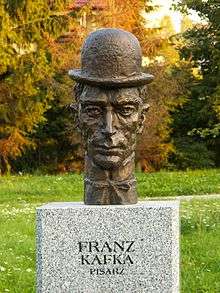
If you only followed the parables you yourselves would become parables and with that rid of all your daily cares.
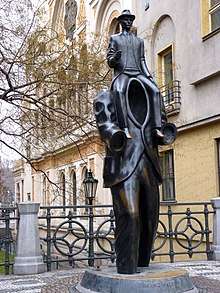
To fight against this lack of understanding, against a whole world of non-understanding, was impossible.
- A man once said: Why such reluctance? If you only followed the parables you yourselves would become parables and with that rid of all your daily cares.
Another said: I bet that is also a parable.
The first said: You have won.
The second said: But unfortunately only in parable.
The first said: No, in reality: in parable you have lost.- "On Parables" (1922), translation by Willa and Edwin Muir
- "Everything you say is boring and incomprehensible," she said, "but that alone doesn't make it true."
- "Oh well, memories,” said I. “Yes, even remembering in itself is sad, yet how much more its object! Don’t let yourself in for things like that, it’s not for you and it’s not for me. It only weakens one’s present position without strengthening the former one — nothing is more obvious — quite apart from the fact that the former one doesn’t need strengthening."
- "Description of a Struggle"
- When . . . some leisurely passer-by stopped . . . and spoke of cheating, that was in its way the stupidest lie ever invented by indifference and inborn malice, since it was not the hunger artist who was cheating, he was working honestly, but the world was cheating him of his reward.
- "A Hunger Artist"
- To fight against this lack of understanding, against a whole world of non-understanding, was impossible.
- "A Hunger Artist"
- How much my life has changed, and yet how unchanged it has remained at bottom! When I think back and recall the time when I was still a member of the canine community, sharing in all its preoccupations, a dog among dogs, I find on closer examination that from the very beginning I sensed some discrepancy, some little maladjustment, causing a slight feeling of discomfort which not even the most decorous public functions could eliminate; more, that sometimes, no, not sometimes, but very often, the mere look of some fellow dog of my own circle that I was fond of, the mere look of him, as if I had just caught it for the first time, would fill me with helpless embarrassment and fear, even with despair.
- All knowledge, the totality of all questions and all answers, is contained in the dog. If one could but realize this knowledge, if one could but bring it into the light of day, if we dogs would but own that we know infinitely more than we admit to ourselves!
- "Investigations of a Dog"
- Ours is a lost generation, it may be, but it is more blameless than those earlier generations.
- "Investigations of a Dog"
- So long as you have food in your mouth, you have solved all questions for the time being.
- "Investigations of a Dog"
- "You asking me the way?" "Yes," I said, "since I can't find it myself." "Give it up! Give it up!" said he, and turned with a sudden jerk, like someone who wants to be alone with his laughter.
- Variant translation: The Policeman said to me, "You want to know the way? Give up! Just give up!" And he turned away like a man that wants to be alone with his laughter.
Attributed
- We met a large group of workmen who were marching with flags and banners to a meeting.
Kafka said, "These people are so self-possessed, so self-confident and good humoured. They rule the streets, and therefore think they rule the world. In fact, they are mistaken. Behind them already are the secretaries, officials, professional pohticians, all the modern satraps for whom they are preparing the way to power."
"You do not beheve in the power of the masses?"
"It is before my eyes, this power of the masses, formless and apparently chaotic, which then seeks to be given a form and a discipline. At the end of every truly revolutionary development there appears a Napoleon Bonaparte."
"You don"t believe in a wider expansion of the Russian Revolution?"
Kafka was silent for a moment, then he said:
"As a flood spreads wider and wider, the water becomes shallower and dirtier. The Revolution evaporates, and leaves behind only the slime of a new bureaucracy. The chains of tormented mankind are made out of red tape."- Gustav Janouch, Conversations With Kafka: Notes and Reminiscences (1953), page 71, London: Derek Verschoyle; frequently quoted as "Every revolution evaporates, and leaves behind only the slime of a new bureaucracy."
Misattributed
- By believing passionately in something which still does not exist, we create it. The nonexistent is whatever we have not sufficiently desired.
- Attributed to Kafka in Ambiguous Spaces (2008) by NaJa & deOstos (Nannette Jackowski and Ricardo de Ostos), p. 7, and a couple other publications since, this is actually from Report to Greco (1965) by Nikos Kazantzakis, p. 434
Quotes about Kafka
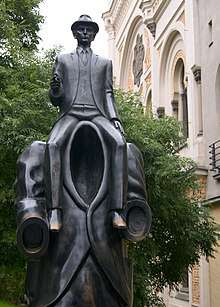
Kafka described with wonderful imaginative power the future concentration camps, the future instability of the law, the future absolutism of the state Apparat. ~ Bertolt Brecht
- Sorted alphabetically by author or source
- He is interested in the feelings of the squash ball, and of the champagne bottle that launches the ship. In a football match his sympathy is not with either of the teams but with the ball, or, in a match ending nil-nil, with the hunger of the goalmouth.
- Alan Bennett, Writing Home (1994), p. 336
- Kafka described with wonderful imaginative power the future concentration camps, the future instability of the law, the future absolutism of the state Apparat.
- Bertolt Brecht, as quoted in TIME magazine (18 July 1983)
- The whole art of Kafka consists in forcing the reader to re-read. His endings or his absence of endings, suggest explanations which, however, are not revealed in clear language but, before they seem justified, require that the story be reread.
- Albert Camus, Hope and The Absurd in the Work of Franz Kafka.
- The way in which he experienced estrangement was literature, with an intensity greater than that of any other writer of this century, more inexorably than Joyce or Proust or Mann. From this experience flows the power of Kafka’s works to comprehend all forms of alienation, and to suggest a response to political estrangement different from political counterterror: the effort to illuminate this condition by grasping through literature that play is the reward for the courage of accepting death.
- Stanley Corngold, as quoted in the Introduction of The Metamorphosis (1972), p. xxi
- The only way Kafka could envisage of creating his in every respect impossible writing possible was to demarcate the area of impossibility by making a language without a particular color, without a local tone, without qualities, as it were.
- Marthe Robert, As Lonely as Kafka (1953)
- The work of Kafka … has been subjected to a mass ravishment by no less than three armies of interpreters. Those who read Kafka as a social allegory see case studies of the frustrations and insanity of modern bureaucracy and its ultimate issuance in the totalitarian state. Those who read Kafka as a psychoanalytic allegory see desperate revelations of Kafka’s fear of his father, his castration anxieties, his sense of his own impotence, his thralldom to his dreams. Those who read Kafka as a religious allegory explain that K. in The Castle is trying to gain access to heaven, that Joseph K. in The Trial is being judged by the inexorable and mysterious justice of God.
- Susan Sontag, in "Against Interpretation" (1964), in Against Interpretation and Other Essays (1966)
External links
- Das Schloss
- The Kafka Project
- Franz Kafka Online
- Biography and photos
- Franz Kafka (1883-1924)
- "In Search of K" (14 December 2006) from Kenyon Review
- Summary of Kafka Criticism
- Franz Kafka on IMDb
- The Trials of Franz Kafka by Kelly Grovier in The Observer
- The SDSU Kafka Project
- Franz Kafka and Libertarian Socialism
- The Diaries of Franz Kafka serialised as a weblog
- Laughing with Kafka by David Foster Wallace
- The Metamorphosis quotes analyzed; study guide & teaching guide with themes, characters, summary, literary devices
- The Trial quotes analyzed; study guide & teaching guide
This article is issued from
Wikiquote.
The text is licensed under Creative
Commons - Attribution - Sharealike.
Additional terms may apply for the media files.
